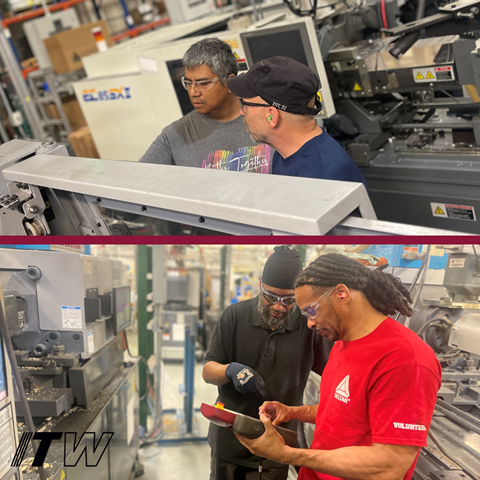
At ITW, when we talk about developing great leaders across the enterprise, we encourage our teams to develop and build critical skills using the 70-20-10 model, which highlights and supports how our colleagues best learn and develop.
Most articles I read on LinkedIn or corporate websites are written to inspire others.
This one is different. It’s about how my team inspires me.
This piece doesn’t come with tips and tricks, advice or wisdom; it’s completely to share how genuine teamwork and ongoing technical training has revolutionized the work our team is doing.
First, I’ll share some context to explain why it is crucial for our teams to support one another in on-the-job training. Then, I’ll describe some of the incredible efforts and actions our team has been putting forth. These are the efforts that will allow our business to grow, and quite frankly, flourish in future years.
To share some context, we are operating in one of the largest labor shortages in decades. Since 2019, the labor market has seen “a loss of just under 3.5 million workers” (Forbes). We hear almost daily about ‘the great resignation.’ If you only read the news, you might think most employees today live in a constant state of cynicism, and that finding genuine teamwork or initiative at work would be virtually impossible. At least, that’s the message I see in the news these days.
In the last few months, the operations team at Deltar Fasteners has completely turned that message on its head. They’ve stepped up, worked together, and are demonstrating results through a new focus on technical training.
They are right to focus on this, because without it, people do not grow or develop. While recruiting and staffing will be the focus in most businesses for the foreseeable future, technical training is the glue that holds it all together. Further, having a team that executes on technical training is a primary difference between a “job” and a “career” for many people. The team at ITW Deltar Fasteners has figured that out and is working toward a future where this training is our primary focus.
We have incredibly skilled technicians setting this example, all with different backgrounds and years of experience:
Matt Trotter has spent most of his career working in what we call “1-Shot” products, which is where most of our mold technicians start their careers in our plant. Recently, he’s been pushing himself to learn new skills in our “2-Shot” cell that involves a higher level of robotics and automation. Ranon Campbell has spent most of his time at Deltar in the 2-shot cell, and has been supporting Matt by working alongside him.
Sven Lopez and Jim Metille have been using their time and experience to mentor mold technicians in different areas, including off-shifts.
Jamal Darden and Domonic Perozzi started with us as General Technicians and have been the first to formally enter into the Mold Technician Apprenticeship program. Korey Popko and Don Charleston are doing similar work in the tool room, while Daniel Donovan, Joey McElroy and James Quigley follow suit in the maintenance and automation departments. They’re training at work and taking courses at local community colleges.
Ken Dearing is also using his experience to lead and develop a training program for people entering the Mold Technician space for the first time. He is working with Paul DeJong and Lisa Johnson to collaborate between divisions.
As if that wasn’t enough, our colleagues at our sister facility in Chippewa Falls, Wisconsin wanted to help with this focus on technical training. Even with a six-hour drive between our facilities, they found a way to share 1-2 technicians with us each week so that we could “free up” our own people to focus on training their co-workers on skills that would make them more versatile within the plant. People like Chris McConville, Scott Wendt, Dan Thornton, Dennis Iverson, Robert Bazel, Chris Poe, Yee Xiong, Travis Iverson, Julie Radke, Bryon Nesvacil, Andrew Pitsch, Anthony Dienger, Jennifer Prokopinski and Brian Gillet were all integral parts of this effort.
Seeing the entrepreneurial spirit, teamwork, and support shown by these technicians and leaders has been inspiring. Seeing people take such pride in their work, and in showing it to others, is something that you do not see everywhere. That’s what I’m seeing here, and I can’t wait to see what we do in the next five years.
At ITW, when we talk about developing great leaders across the enterprise, we encourage our teams to develop and build critical skills using the 70-20-10 model, which highlights and supports how our colleagues best learn and develop. This model refers to the fraction of time spent with on-the-job experiences, receiving coaching and feedback, and going through formalized training or coursework.
This team has shown real commitment to this model, both in how they have taken initiative in new areas, shared their knowledge, and in how they have spent time in completing their formal training requirements.
To my team in Frankfort:
With every procedure you help write, every training session you complete, and every skill you set out to learn, you are changing the future of our business and your coworkers. Continue seeking coaching, continue seeking feedback, and let this be your mission. Let this be what drives you every day.
Thank you for the work that you do and your commitment to your trade. It’s inspiring and makes me proud to be your Plant Manager.
Sincerely,
Joseph Schneider
Plant Manager
ITW Deltar Fasteners